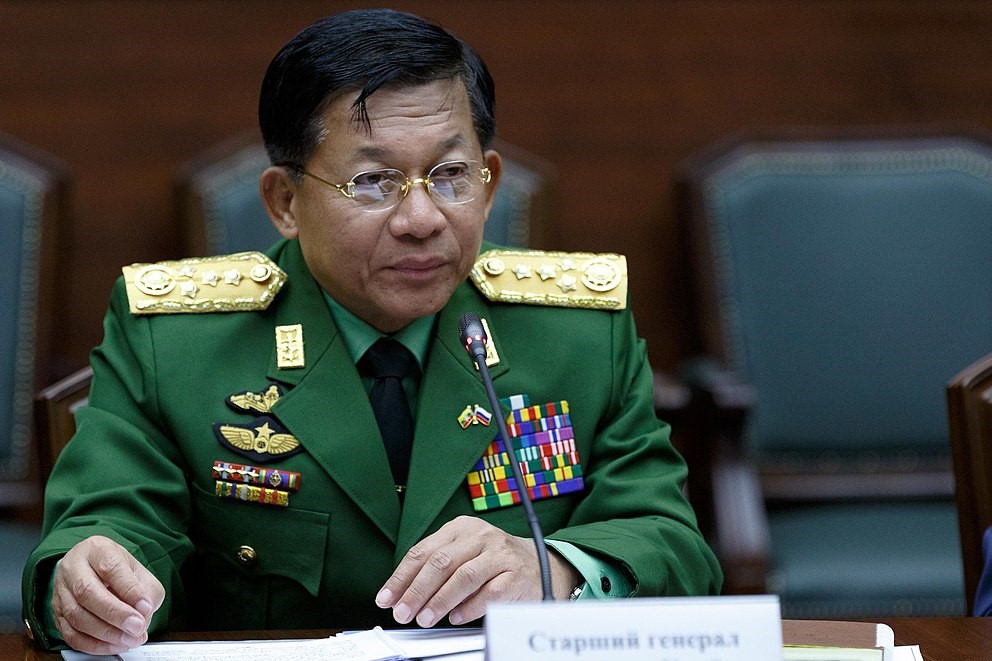The International Commission of Jurists (ICJ) welcomes the International Criminal Court (ICC) Prosecutor’s request for an arrest warrant against Senior General Min Aung Hlaing for alleged crimes against humanity of deportation and persecution of the Rohingya, committed in Myanmar, and in part in Bangladesh in 2017.
“The ICC Prosecutor’s long-awaited request for an arrest warrant against Senior General Min Aung Hlaing is a significant step towards seeking accountability for the atrocities committed against the Rohingya by the Myanmar military and security forces,” said Melissa Upreti, ICJ Regional Director for Asia and the Pacific.
The ICC Prosecutor’s Office submitted that there are reasonable grounds to believe that Senior General Min Aung Hlaing is criminally responsible for the crimes against humanity of deportation and persecution of the Rohingya allegedly committed between 25 August and 31 December 2017 by the armed forces of Myanmar, supported by the national police, the border guard police and non-Rohingya civilians.
The ICC Prosecutor’s statement noted that this is the first application for an arrest warrant against a high-level Myanmar government official that his Office is filing, and more will follow.
It comes five years after the Independent International Fact-Finding Mission on Myanmar found acts of genocide, crimes against humanity and war crimes had been committed against the Rohingya population, including sexual violence and other gender-based crimes.
“The wheels of justice have turned slowly for the Rohingya, but this application by the ICC Prosecutor sends an important signal against the impunity that has emboldened the military junta and security forces to commit further atrocities against the people of Myanmar, including against other ethnic and religious groups, especially in the aftermath of the 2021 military coup.” added Upreti.
Until today, no one has been accountable for the widespread and systematic crimes directed specifically against persons of the Rohingya population in 2016 and 2017, despite the persistent demands for justice and accountability from the persecuted community. Violations perpetrated since the 2021 military coup have also not been met with a strong enough response from the international community.
Min Aung Hlaing has enjoyed ASEAN’s reliance on the purported principle of “non-interference” in its engagement in the region, despite persistent allegations about his responsibility for alleged crimes committed against ethnic groups in Myanmar and his orchestration of the military coup in 2021. If issued, Rome Statute States Parties will be obligated to arrest Min Aung Hlaing and hand him over to the Court should he enter their territory. Arrest warrants should also signal to non-States Parties the need to reconsider their invocation of the “non-interference” rhetoric in respect of the Myanmar situation.
Background
Under the terms of the Rome Statute, the Pre-Trial Chamber shall, on the application of the Prosecutor, issue a warrant of arrest if it is satisfied that, among other considerations, there are reasonable grounds to believe that the person has committed a crime within the jurisdiction of the Court and the arrest of the person appears necessary.
Although Myanmar is not a State party to the Rome Statute of the International Criminal Court, on 14 November 2019, ICC Judges authorized the ICC Prosecutor to initiate an investigation into crimes within the Court’s jurisdiction in which at least one element occurred on the territory of Bangladesh – a State party to the Rome Statute – and within the context of the 2016-2017 atrocities in Rakhine State, and other crimes sufficiently linked to these events. The ICJ had filed an amicus curiae brief arguing that the ICC had such jurisdiction.
The crimes that are the subject of the ICC’s investigation constitute just a small proportion of the alleged atrocity crimes in Myanmar in recent years. The UN Security Council has not referred the overall situation in Myanmar to the ICC, despite broad calls for it to do so. Such a referral would grant the ICC Prosecutor jurisdiction over all alleged Rome Statute crimes committed in Myanmar, including those committed in the aftermath of the February 2021 coup.
Contact
Daron Tan, Associate International Legal Adviser, ICJ Asia and the Pacific Programme, e: daron.tan@icj.org
Further reading
ICJ, “Myanmar: New ICJ report highlights opportunities for international accountability actors to ensure gender-inclusive justice for atrocity crimes”, 30 September 2024
ICJ, “Unseen and Unheard: Violation of Women’s Rights in Myanmar, 1 July 2024
ICJ, “Myanmar: Unlawful attacks resulting in mass casualties to civilians and destruction of infrastructure in Rakhine State must end”, 24 May 2024
ICJ, “ICJ submits Amicus Curiae Brief to International Criminal Court”, 18 June 2018
ICJ, “Myanmar: rule of law must drive responses to Rohingya crisis”, November 2017





